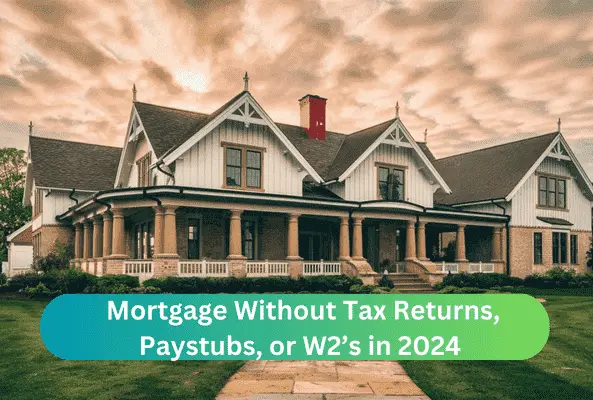Best 8 Ways to Avail Mortgage Without Tax Returns, Paystubs, or W2’s in 2024

Table of Contents
Introduction
Dreaming of owning a home but worried about not having the typical paperwork like tax returns or paystubs? You’re not alone. Many people, especially freelancers and self-employed individuals, face this challenge. But don’t worry – there are alternative ways to qualify for a mortgage without tax returns, paystubs, or W2’s. In this guide, we’ll walk you through different options so you can achieve your dream of owning a home, even without traditional income documentation.
Understand the Challenge for Mortgage without Tax Returns or Other Traditional Documents
- Why traditional paperwork is a problem: Banks usually want to see tax returns, paystubs, or W2’s to make sure you can repay a mortgage. But if you’re self-employed or have irregular income, it’s hard to provide these. When you work for yourself or earn money in unconventional ways, your income may fluctuate from month to month or come from various sources, making it challenging to present a clear picture of your financial stability.
- Common hurdles for self-employed and freelancers: Because their income can vary a lot, it’s tough for banks to judge if they can afford a mortgage. Self-employed individuals and freelancers often face difficulty in proving their income stability to traditional lenders. They may have a steady stream of income but lack the traditional paperwork to demonstrate it, such as regular pay stubs or W2 forms. As a result, they can encounter obstacles when trying to qualify for a mortgage.
- How unconventional income affects mortgage approval: If your income comes from sources like renting out property or investments, it’s hard to prove to a bank that you can pay back a loan. Lenders typically assess a borrower’s ability to repay a mortgage based on their income. However, when income is derived from unconventional sources or fluctuates significantly, traditional income documentation may not accurately reflect the borrower’s financial capacity to repay the loan. This can make it challenging for individuals with unconventional income to qualify for a mortgage through traditional channels.
Exploring Alternative Loan Programs
Bank Statement Loans - How they work?
Instead of paystubs, you show the bank your bank statements to prove your income. Bank statement loans, also known as self-employed mortgages or non-QM (non-qualified mortgage) loans, are designed for individuals who have difficulty providing traditional income documentation. – Who they’re good for: Great for freelancers and self-employed folks who don’t have regular paychecks. These loans are particularly suitable for individuals with variable income streams or those who earn income from multiple sources.
No Ratio My Community Loan: - What they are?
Loans that focus more on your credit score and assets than your income. No Ratio My Community Loans, also known as “no-doc” loans, are mortgage programs that prioritize a borrower’s creditworthiness and assets over their income verification. – Who they help: People with non-traditional income sources or irregular pay. These loans are ideal for borrowers who have difficulty providing traditional income documentation or whose income fluctuates significantly.
DSCR Mortgages - How they're different?
These loans look at how much income a property can make to cover its mortgage. Debt-Service Coverage Ratio (DSCR) mortgages, also known as rental property loans, assess a property’s ability to generate rental income to cover mortgage payments and expenses. – Who they’re for: Investors or anyone buying a rental property. DSCR mortgages are suitable for real estate investors, landlords, and individuals purchasing rental properties who may not meet traditional income requirements but have sufficient rental income to support the mortgage.
Profit & Loss Only Mortgages - How they work?
Instead of tax returns, you show a Profit & Loss statement for your business. Profit & Loss Only Mortgages, also known as stated income or self-employed mortgages, allow borrowers to use their business’s profit and loss statements to demonstrate their income. – Who they help: Self-employed people who don’t have paystubs or W2’s. These loans are tailored for self-employed individuals, small business owners, and freelancers who may have difficulty providing traditional income documentation but have a reliable income from their businesses.
FHA Loans - Why they're special?
They’re backed by the government and are easier to qualify for. Federal Housing Administration (FHA) loans are government-insured mortgages that offer more lenient qualification requirements compared to conventional loans. – Who they’re good for: Anyone with irregular income or without traditional paperwork. FHA loans are suitable for borrowers with non-traditional income sources, low credit scores, or limited financial resources, making homeownership more accessible to a broader range of individuals.
Non-Qualified Mortgages (Non-QM) - What they offer?
More flexible requirements than regular mortgages. Non-Qualified Mortgages (Non-QM) are mortgage loans that do not meet the criteria for qualified mortgages (QM) set forth by the Consumer Financial Protection Bureau (CFPB). – Who they’re for: People who can’t meet traditional standards but still need a loan. Non-QM loans are ideal for borrowers who may not qualify for traditional mortgages due to factors such as self-employment, non-traditional income sources, or credit issues.
Hard Money Mortgages - How they're different?
These loans focus more on the property’s value than the borrower’s income. Hard money mortgages are asset-based loans that are secured by the value of the property rather than the borrower’s creditworthiness or income. – Who they’re for: Investors or those looking to flip houses. Hard money mortgages are popular among real estate investors, house flippers, and individuals who need quick financing for property acquisition or renovations.
Private Lenders - Who they are?
Lenders outside of traditional banks who might be more flexible. Private lenders, also known as non-bank lenders or alternative lenders, are individuals or institutions that provide mortgage loans outside of traditional financial institutions. – Who they’re for: People who can’t get a loan from a regular bank. Private lenders cater to borrowers who may have difficulty qualifying for a mortgage through traditional channels, such as self-employed individuals, real estate investors, or those with credit issues.
Conclusion
Owning a home is possible even if you don’t have the typical paperwork like tax returns or paystubs. With alternative mortgage options like bank statement loans and FHA loans, you can still make your homeownership dreams come true. Remember to explore different lenders and loan types to find the best fit for your unique situation. Don’t let paperwork stand in the way of owning your own home!
For similar articles. Click Here
Frequently Asked Questions
Yes, many alternative loan programs cater to self-employed individuals and freelancers who have difficulty providing traditional income documentation and want to avail mortgage without tax returns. These programs may require alternative forms of income verification, such as bank statements, profit and loss statements, or rental income documentation.
The credit score requirements for alternative loans vary depending on the lender and loan program. While some programs may accept lower credit scores, it’s generally advisable to have a credit score of at least 620 to qualify for most mortgages. However, borrowers with higher credit scores may have access to more favorable loan terms and can avail mortgage without tax returns.
While alternative mortgage options offer flexibility for borrowers without traditional income documentation, they may come with higher interest rates, fees, or stricter requirements, if you want mortgage without tax returnss or other traditional documents. Additionally, not all lenders offer these types of loans, so borrowers may need to shop around and compare their options to find a suitable lender.
Researching and comparing lenders is essential when exploring mortgage without tax returns or other traditional documents. Look for lenders with experience in providing loans to self-employed individuals and freelancers, as well as those who offer a variety of loan programs tailored to non-traditional income sources. Reading reviews, seeking recommendations from trusted sources, and consulting with mortgage brokers can also help identify reputable lenders who specialize in alternative mortgages.
